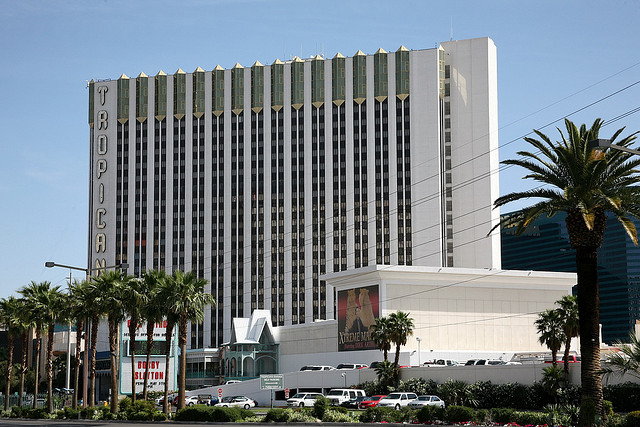Describing the property as a dormitory, the new owners of the Tropicana Las Vegas are planning on making a few changes since paying $360 million for the property. Tim Wilmott, the CEO of Penn National Gaming, the company behind the purchase, stated that the gaming company has a commitment to improving the resort located on the Las Vegas Strip, which will consist of bringing in non-gaming amenities.
Currently customers have to cross Tropicana Boulevard and the Strip to visit other venues to enjoy a nice meal. According to Wilmott, the hotel rooms and suites are high quality and in excellent condition. However, the four restaurants of the venue are not up to the company’s standards.
The new owners feel that the food and beverage revenue of the Tropicana is dwarfed by the revenues provided by the M Resort, which is located in Henderson, and owned by Penn National, even being just one quarter the size of the Tropicana hotel capacity.
Wilmott stated that Penn National sees a great deal of potential in the Tropicana and in their initial efforts, will be making changes to improve the restaurants. Upgrades to the restaurants will come next year as the company plans on evaluating food outlets to see what would be the perfect fit for the customer base of the property as well as the resort.
When Penn National purchased the Tropicana in August, the property closed and the company stated they planned on spending as much as $200 million to upgrade the property in a four year time frame. The first steps will be to improve the slot machine floor by adding new games and upgrading the technology to include the player rewards system of Penn National.
Penn National has a database of 3 million members in their rewards system and has almost 30 casinos and racetracks in the United States. Executives of Penn National were motivated to purchase the Tropicana since over one quarter of their customers visit the Strip.
At this year’s G2E, Penn National was able to bring in analysts to the Tropicana for evaluation. The hotel rooms were found to be in good shape due to a previous upgrade by the former owners. The non-gaming amenities, including the restaurants were found to be lacking.
Steven Wieczynski, a gaming analyst of Stifel Nicalous Captial Markets, stated that as an analyst, the property’s look was impressive, especially the guest rooms. However there was plenty of ‘low hanging fruit’ that the Penn National Gaming management team would have to identify and then make corrections to drive the profitability of the property even higher.



